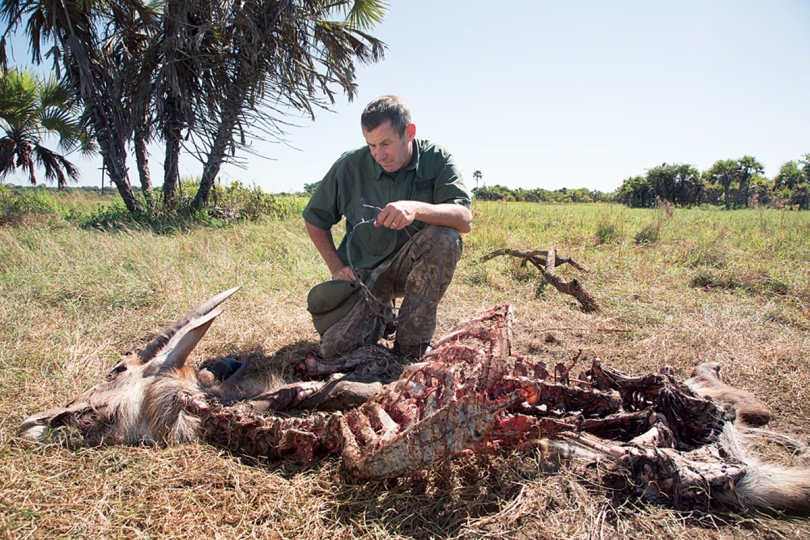Going to war over wildlife

Hunter-conservationist Ivan Carter takes viewers deep inside Africa on his quest to stop poachers
PROFESSIONAL HUNTER and committed conservationist Ivan Carter makes his television debut in Asia tonight with “Carter’s WAR”, an Outdoor Channel series that takes viewers deep inside Africa to the frontlines of the war being waged with the continent’s wildlife.
Born and raised in Southern Rhodesia, the country that later became Zimbabwe, Carter brings his 25 years of experience as a professional guide to show how the continent’s most precious resource is in danger of extinction. The series takes viewers on a tense and often heart-breaking journey that sees him attempting to confront the wildlife transgressors trying to destroy its habitats for tusks and horns. “WAR” – it stands for wildlife animal response – will also help viewers understand the constant struggle of the African people and the importance of conservation practices.
We chatted with the 46-year-old while he was in Bangkok earlier this month to promote his show.
WHAT’S THE STORY BEHIND “CARTER’S WAR”?
The way coverage of Africa is handled today, you really only see three things. You look at a news channel and you see all the wars, the drought the starvation and the refugees or you look at Discovery Channel and you see the sunsets and the giraffes. The History Channel focuses on the beautiful people of Africa. Not a single programme talks about a place where the people and the animals meet. Yet in Africa today there are more people than ever before and hence more conflict between wildlife and people than ever before.
With this programme, we try to entertain so viewers will want to know what happens next. Then we want to educate them by providing them information that most of the world doesn’t know. And most importantly we want to show them the solution to these problems in such a way that we all become engaged as a global community. I want people to understand that, for example, thinking about the earth on Earth Day doesn’t save the earth. I want the viewers to become emotionally involved so they want to do something about it, to put all their support behind the people on the frontline who really want to solve the problems. It’s not a dark, unhappy programme but one of hope and solutions.
WHY ARE YOU SO DRIVEN TO TELL THESE STORIES?
It’s not about me; it’s all about our children. My children might not go to Africa as adults, maybe they don’t want to, but we have to preserve the choice for them. Every single day in Africa 100 elephants are killed illegally for their tusks. Those tusks end up getting carved and put in people’s houses as ornaments. Do we want our children to inherit the ornaments or be able to see the animals?
It’s also about the people on the frontline who work hard but are not recognised nor supported. Many times they can’t do the preservation work because there’s not enough funding. And they’re not marketing people. I intend to become their voice.
WHAT DO YOU THINK CAUSES WILDLIFE POACHING?
If there’s something of value, people will try to steal it and sell it – whether it’s cocaine, diamonds, money or rhino horns. The higher the value, the more risks they are willing to take to steal it. One ounce of a rhino horn is sold on black market at US$15,000 or about Bt525,000, and a big rhino can have 10 pounds (4.5kg) of horn. You can imagine the money the horns are worth, and people die trying to steal and sell them. It’s the most expensive commodity on earth.
YOU THINK SELLING WILDLIFE ANIMAL PARTS SHOULD BE MADE LEGAL?
Yes. The rhino horn will grow back but a dead rhino can never come back to life. So if you cut the horn, and legally sold that horn, in five years time the horn is back. If we can dream for a minute here: what if there’s a legal way to trade wildlife? Let’s say every year one distributor takes 20 tonnes of horns cut from the animals and leaves them alive from Africa, and sells the horn. Then people in Africa earn money from the rhinos and every community wants to have rhinos so as to make money. What happens today is nobody wants to have rhinos because security is very expensive and you cannot get a any investment return because there is no way to trade.
We have to open our minds to solutions. Unfortunately with wildlife, the emotion stops the solutions because people think it’s not good to “farm” rhinos, that they’re supposed to be wild. Well, they are going to be extinct pretty soon if they continue to think like that. We should not allow our emotions to override our common sense and steer us away from practical solutions.
WHAT WERE THE BIGGEST SURPRISES IN MAKING THE SHOW?
It was a lot harder than I thought to actually capture real-time events. Everything you see in the show is real; none of it was staged or done just for the camera. The scenes are highly dramatic but never easy to film.
SEASON 2 HAS STARTED FILMING. WHAT CAN WE EXPECT?
We started filming early this year. We will be covering the use of military tracker dogs to combat poaching, follow some of the world’s foremost anti-poaching teams and get a rare glimpse into what their lives involve. We will also be filming the move of elephants from an area of great conflict into a new national park. It promises to be a very busy, highly compelling and provocative season.
GREAT ADVENTURE
“Carter’s WAR” premieres at 8 tonight on the Outdoor Channel Asia (True Visions 673). New episodes are broadcast each Thursday.
For more details, check www.Facebook.com/IvanCarterSAfrica.
RELATED





